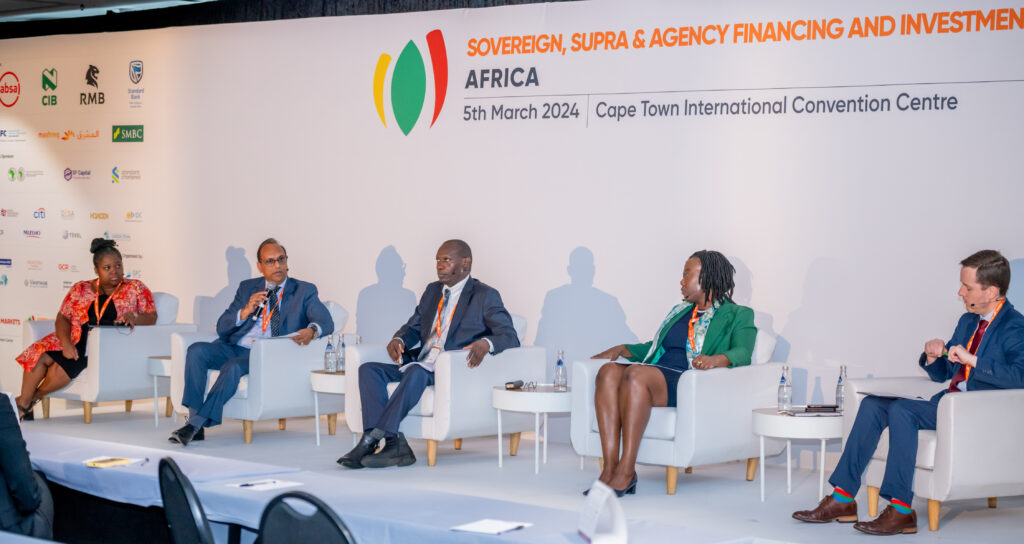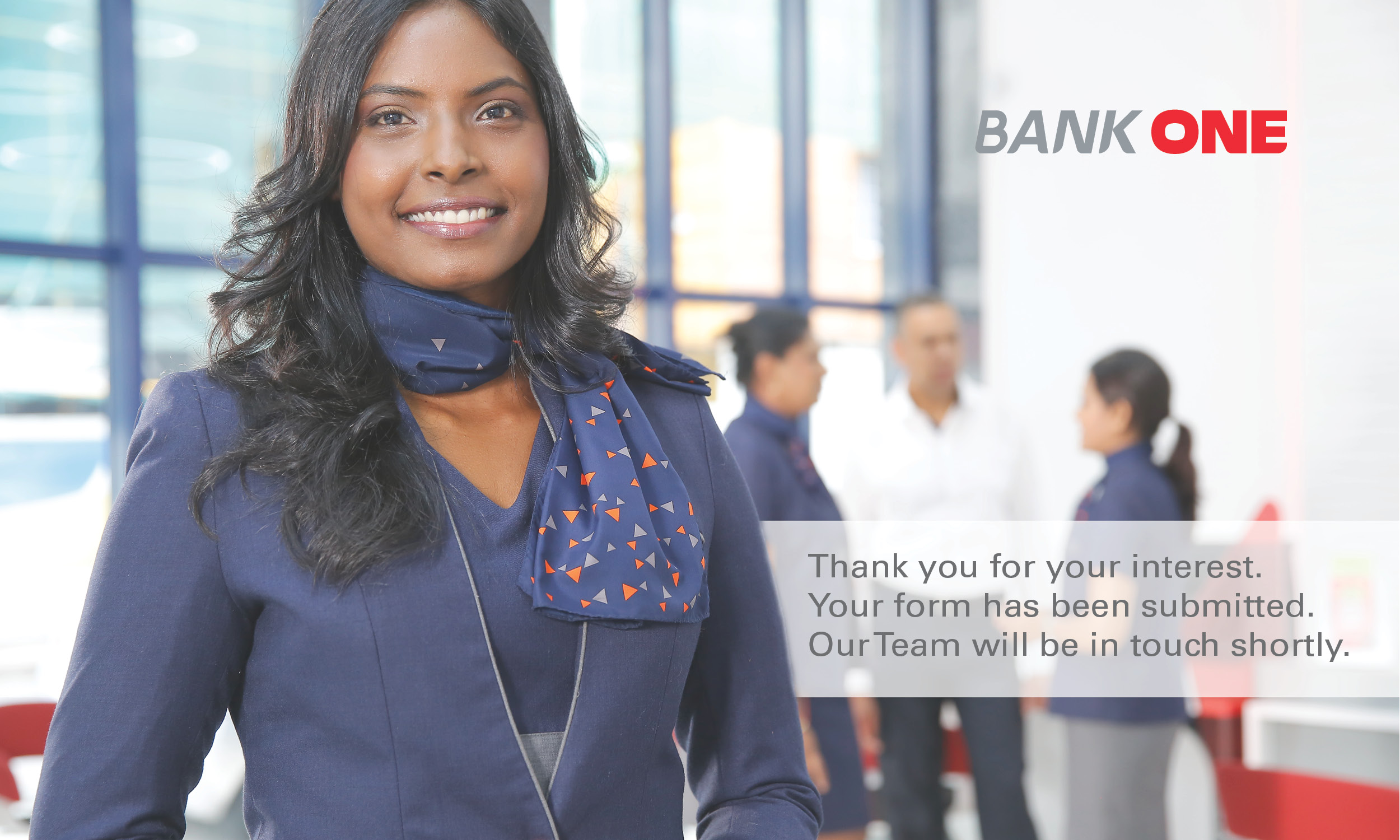BANK ONE
16, Sir William Newton Street
Port Louis, Mauritius


The Bonds, Loans & ESG Capital Markets Africa 2024 conference, held from 5th to 6th March 2024 in Cape Town and hosted by GFC Media Group, gathered Africa’s financial elite to discuss on the opportunities and challenges faced by the region. As proud sponsors, we were delighted with the opportunity to engage with over 1,100 decision-makers from Africa’s capital markets.
During the conference, Thavin Audit, our Deputy Head of CIB, joined other seasoned financial professionals namely from the Ministry of Finance, Planning and Economic Development (Uganda), The Autonomous Sinking Fund (Cameroon), the African Development Bank and Nedbank for a panel discussion. The session focused on the crucial theme of “Promoting sustainable development in African sovereigns: How are governments addressing the implementation of Sustainable Development Goals?” Discover the key takeaways of the session from Thavin’s perspective:
The Sustainable Development Goals (SDGs), established in 2015 by 193 nations under the United Nations, provide a comprehensive blueprint for global advancement by 2030. This collective agreement signifies a shared commitment to enact positive change and enhance the well-being of people worldwide through the implementation of the 17 identified SDGs. Against the backdrop of climate change, escalating conflicts, violence, and inequality, global leaders have underscored the imperative for unified global cooperation to address these pressing challenges.
The growing importance of synergy between the public and private sectors has become evident, with potential impact on international development and progress towards achieving the SDGs. In Mauritius, governmental commitment to environmental protection, sectoral reforms, and inclusive, green initiatives are evident in the National Budget 2023-24, focusing on gender equality, the introduction of e-health, poverty alleviation, and energy transition.
The Mauritius SDGs Investor Map, established in 2022, directs private capital to emerging sectors prioritizing SDGs, fostering inclusivity and sustainability. Recent global crises, including the Covid-19 pandemic, the Russian-Ukrainian conflict, and extreme climate events, highlight the necessity for resilient economies and the role of the private sector in financing sustainable development alongside governments. It is imperative for African governments to translate words into actions, leveraging diversified financing opportunities in partnership with the private sector to drive economic, social, and environmental reforms collectively.
Financing serves as the fuel propelling SDG progress towards global advancement. The financial services industry and the banking sector, in particular, play pivotal roles. Commercial banks increasingly recognize the importance of integrating SDGs into their business operations, aligning strategies with environmental, social, and governance (ESG) criteria. Initiatives include the offering of sustainable finance products like Green Bonds, Social Impact Loans, and Sustainable Investment Funds that bolster projects aligned with the SDGs.
In Mauritius, the Central Bank has demonstrated a commitment to recognizing climate-related and environmental risks, obliging commercial banks to incorporate the management of these risks into their operations. Furthermore, the Central Bank has actively contributed to the development of a Green Finance framework, facilitating the issuance of Sustainable Bonds to support sustainable development endeavors. Investment funds are also directing their focus towards Africa with an ESG agenda.
Bank One recognizes sub-Saharan Africa as a region ripe with potential for growth and land of opportunity for sustainable development. Our financing endeavors prioritize alignment with the SDGs, emphasizing impact financing to alleviate poverty and enhance access to education. With an in-house sustainable finance team, we ensure adherence to ESG guidelines, conducting business visits to ensure that the financing serves its intended purpose.
Partnerships, such as our collaboration with the International Finance Corporation (IFC), allow us to better assess and mitigate climate-related financial risks across our business portfolio. Our commitment to increasing our exposure in Africa, particularly in sub-Saharan Africa, remains unwavering, despite the challenges inherent in SDG financing on the continent.
Acknowledging the bumpy road ahead, we remain steadfast on our commitment to serve as a catalyst for positive change in SDG financing across Africa. Our vision extends beyond financial gains, with a focus on making a meaningful impact on the lives of millions. Through these efforts, we are dedicated to driving transformative change and contributing to the collective advancement of the SDGs in Africa.
Looking ahead, sub-Saharan Africa is confronted with an urgent need to mobilize $50 billion annually to address climate adaptation, underscoring the pressing demand for sustainable financing solutions. The global green bond market has experienced substantial growth over the past decade, now reaching $2 trillion with participation from 40 countries. However, in sub-Saharan Africa, progress has been limited, with only 16 bond issuances to date, representing just 1.5% of total global green bonds. Despite the potential for proceeds to be directed into critical infrastructure projects including energy, water, and transportation, investor appetite remains muted due to perceived high risks compared to other emerging economies.
Mauritius has made significant strides in SDG implementation, with notable achievements in poverty alleviation and sustainable infrastructure. However, the journey to attain perfect implementation remains ongoing. Mauritius’ success lies in its collaborative approach, fostering partnerships between public and private sectors to advance initiatives such as educational hubs and sustainable finance. At regional level, joint submissions on maritime space exemplify Mauritius’ commitment to collective progress.
While challenges persist in SDG financing in sub-Saharan Africa, initiatives like the green bond market offer promising avenues for mobilizing funds. With continued collaboration and innovative strategies, the region can overcome barriers and accelerate progress towards sustainable development. Bank One is determined to continue leveraging its expertise and partnerships to drive sustainable financing initiatives in Africa, contributing to the realization of the SDGs and fostering a more prosperous, stable, and equitable future on the continent.

Bank One Disclaimer
Legal Notice
Welcome to www.bankone.mu!
Please read the following important information before accessing this Website:
This Website is owned and operated by BANK ONE LIMITED and the use thereof indicate that you accept the Bank’s Terms and Conditions of Use.
If you do not agree to the Terms and Conditions of Use, you should not use the Website.
The Bank may, at its entire discretion, at any time and without notice, modify or update such Terms and Conditions of Use. Such changes shall be effective immediately and you shall be deemed to have accepted same if you continue to use the Website.
Although the Bank endeavours to provide correct information on its Website, it does not give any warranty express or implied as to its accuracy, completeness and reliability.
The Bank does not accept any liability for any errors or omissions of whatsoever nature as regards information, materials, functions and applications contained in its Website or as to any third-party Websites linked to or from its Website.
Terms & Conditions of Use
1) Information available on the Website are allowed to be printed and / or downloaded for personal use only and not for commercial purposes.
You may not reproduce, transmit or store any information contained on the Bank’s Website on any other Website without the Bank’s written permission.
2) The Website is intended to provide general information on the Bank and its products and services.
No information contained on the Website shall constitute or is intended to constitute financial, legal, accounting, investment or other professional advice or services. You are advised to take professional advice from a suitably qualified professional or adviser before taking any decision relating to your finances or business.
3) You acknowledge that information transmitted via the Internet is susceptible to monitoring and interception and you will be bear all risk of using such means. You further acknowledge that any unsolicited information communicated to us via Internet cannot be guaranteed to remain confidential.
4) The Website may contain technical, typographical or other inaccuracies and you are urged to contact us to confirm all information contained on this Website before placing any reliance on it.
5) The Bank agrees to make reasonable efforts to ensure full performance of its Internet Banking transactions. The Bank will be responsible for acting only on those instructions sent through Internet Banking which are actually received. The Bank does not assume responsibility for any malfunctioning in communication facilities not under its control that may affect the accuracy or timeliness of messages you send. The Bank will not be responsible for any losses or delays in transmission of instructions arising or caused by any browser software. It will, furthermore, not be accountable should you provide incorrect instructions or if your payment instructions are not given sufficiently in advance to allow for timely payment or delays in mail service.
Collection of Information
The Bank will not collect any information about you except where it is knowingly provided to us through this Website. The information we collect about you will depend on how you use the facilities offered via this web site.
In the event that you enter information in the process of completion of an online application form, the information will only be collected by us if you submit that online application to us. In other words, if you log out prior to submitting your application, any information which you had entered would be automatically deleted.
The Bank requires information to understand your needs and provide you with a better service, and in particular for the following reasons:
Internal record keeping.
Use the information to improve its products and services.
Sending periodicals and promotional emails on new products, special offers or other information which the Bank thinks you may find interesting using the email address which you have provided.
Our Contact Centre may call you to suggest products and services that are relevant to your needs based on the information you have provided.
Occasionally, the Bank may also use your personal information to contact you for market research purposes.
The Bank may contact you by email, phone, fax or mail and may use the information provided to customise the Website according to your interests.
The Bank will not sell or distribute your personal information to third parties unless it has your permission or is required by law to do so. You may request details of personal information which the Bank holds about you under the Data Protection Act 2004. If you would like a copy of the information held on you, please write to us.
If you believe that any information the Bank is holding on you is incorrect or incomplete, please write to or email us as soon as possible. The Bank will promptly correct any information found to be incorrect.
DISCLAIMER
In no event will the Bank be liable for any damages including but not limited to direct or indirect, special, incidental, consequential or punitive damages, losses or expenses arising out of the use of its Website, or incurred as a result of any failure of performance, transmission of information, any interruption or availability of its Website, delay in operation or transmission, computer virus, loss of data, or otherwise.
Neither the Bank nor its directors, shareholders, agents, consultants, representatives, officers or employees shall be liable for any damages or losses resulting from your use or inability to use its Website or any information contained therein, including without limitation any direct or indirect, special, incidental, consequential or punitive damages whether arising out of contract, statute and tort or otherwise.
"*" indicates required fields